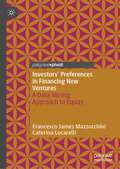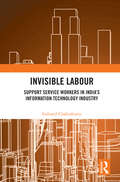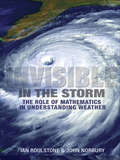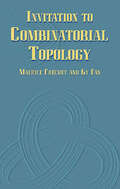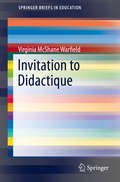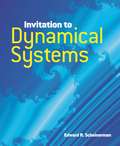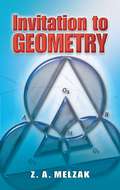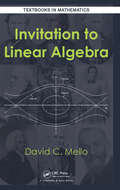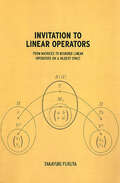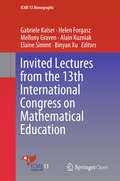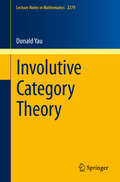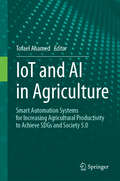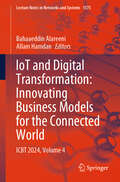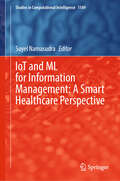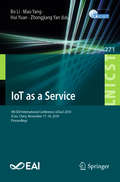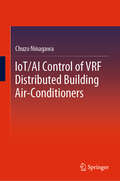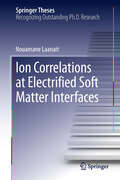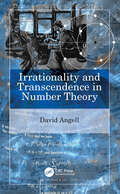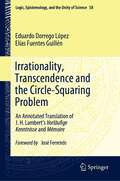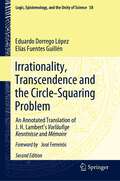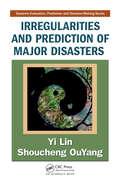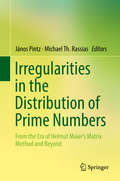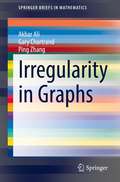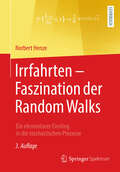- Table View
- List View
Investors’ Preferences in Financing New Ventures: A Data Mining Approach to Equity
by Caterina Lucarelli Francesco James MazzocchiniThis book aims at providing an empirical understanding of the main drivers affecting investors’ preferences in financing new ventures through equity crowdfunding (ECF) and determining fundraising campaign success. ECF is increasing in prominence as a route for new ventures in obtaining external financial resources. To raise capital, entrepreneurs are required to convey quality signals of their proposals with real-time information and knowledge sharing. This book advances knowledge in entrepreneurial finance by investigating the factors that affect individuals’ decisions to participate in ECF. The authors adopt a data mining approach to extract publicly available information from a multitude of crowdfunding platforms across different countries, producing a unique dataset. The book uses an innovative hybrid analysis to generate knowledge patterns creating data-driven models on one hand, and on the other test research hypotheses adopting statistical models to investigate empirical evidence in line, or in contrast, with the extant literature. The book also integrates organizational theories to examine the extent to which ECF platform managers follow a strategy of isomorphism in their choice of information disclosure. The final part of the book discusses how signals are interpreted by investors, how these affect financing preferences, and ultimately the successful completion of a fundraising campaign. The book will be of interest to academics and practitioners in entrepreneurial finance, FinTech, and investment behaviour.
Invisible Labour: Support Service Workers in India’s Information Technology Industry
by Indranil ChakrabortyThis book investigates the life, working conditions, and urban experiences of support service workers, such as janitors, security guards, culinary workers and carpool drivers, in the information technology (IT) sector of India. Largely omitted from academic discourse, support service workers are crucial to the Indian IT industry. Drawing on interviews with such workers in seven Indian cities with a large concentration of software service companies, this volume: Uses quantitative and qualitative analyses to map and assess workers' responses to migration from rural occupations to a modern urban employment setting; Explores the everyday grind of migrant workers in the context of the homogenizing effects of globalization in an alienating urban environment and discusses how their dislodgment from the structures of rural life – gender and caste roles – has placed them in a space of contestation between traditions and the opportunities and challenges offered by digital society in the form of freedom, individualism, flexibility and innovation; Traces the evolution of new areas of class, and identity formations, as well as the hegemonic relations within that ethos imposed by contractors and corporations. The volume will be of great interest to scholars and researchers of sociology and social anthropology, urban studies, development studies, labour studies, social exclusion and South Asian studies.
Invisible in the Storm
by John Norbury Ian RoulstoneInvisible in the Storm is the first book to recount the history, personalities, and ideas behind one of the greatest scientific successes of modern times--the use of mathematics in weather prediction. Although humans have tried to forecast weather for millennia, mathematical principles were used in meteorology only after the turn of the twentieth century. From the first proposal for using mathematics to predict weather, to the supercomputers that now process meteorological information gathered from satellites and weather stations, Ian Roulstone and John Norbury narrate the groundbreaking evolution of modern forecasting. The authors begin with Vilhelm Bjerknes, a Norwegian physicist and meteorologist who in 1904 came up with a method now known as numerical weather prediction. Although his proposed calculations could not be implemented without computers, his early attempts, along with those of Lewis Fry Richardson, marked a turning point in atmospheric science. Roulstone and Norbury describe the discovery of chaos theory's butterfly effect, in which tiny variations in initial conditions produce large variations in the long-term behavior of a system--dashing the hopes of perfect predictability for weather patterns. They explore how weather forecasters today formulate their ideas through state-of-the-art mathematics, taking into account limitations to predictability. Millions of variables--known, unknown, and approximate--as well as billions of calculations, are involved in every forecast, producing informative and fascinating modern computer simulations of the Earth system. Accessible and timely, Invisible in the Storm explains the crucial role of mathematics in understanding the ever-changing weather.Some images inside the book are unavailable due to digital copyright restrictions.
Invitation to Combinatorial Topology (Dover Books on Mathematics)
by Ky Fan Maurice Fréchet Howard W. EvesAn elementary text that can be understood by anyone with a background in high school geometry, Invitation to Combinatorial Topology offers a stimulating initiation to important topological ideas. This translation from the original French does full justice to the text's coherent presentation as well as to its rich historical content. Subjects include the problems inherent to coloring maps, homeomorphism, applications of Descartes' theorem, and topological polygons. Considerations of the topological classification of closed surfaces cover elementary operations, use of normal forms of polyhedra, reduction to normal form, and application to the geometric theory of functions. 1967 edition. 108 figures. Bibliography. Index.
Invitation to Didactique
by Virginia WarfieldThis is an introduction to a Didactique, research program that has been going on in France since the '70s and whose importance is now widely recognized, but whose content is still not easy access to anglophones. The work of Dr. Guy Brousseau has remained largely, in his native France, untranslated and largely unknown. This book will unlock the secrets of Didactique and provide an opportunity for researchers, teacher educators, and students to learn of this important methodology.
Invitation to Dynamical Systems
by Edward R. ScheinermanThis text is designed for those who wish to study mathematics beyond linear algebra but are not ready for abstract material. Rather than a theorem-proof-corollary-remark style of exposition, it stresses geometry, intuition, and dynamical systems. An appendix explains how to write MATLAB, Mathematica, and C programs to compute dynamical systems. 1996 edition.
Invitation to Geometry (Dover Books on Mathematics)
by Z. A. MelzakIntended for students of many different backgrounds with only a modest knowledge of mathematics, this text features self-contained chapters that can be adapted to several types of geometry courses. Only a slight acquaintance with mathematics beyond the high-school level is necessary, including some familiarity with calculus and linear algebra. This text's introductions to several branches of geometry feature topics and treatments based on memorability and relevance. The author emphasizes connections with calculus and simple mechanics, focusing on developing students' grasp of spatial relationships. Subjects include classical Euclidean material, polygonal and circle isoperimetry, conics and Pascal's theorem, geometrical optimization, geometry and trigonometry on a sphere, graphs, convexity, and elements of differential geometry of curves. Additional material may be conveniently introduced in several places, and each chapter concludes with exercises of varying degrees of difficulty.
Invitation to Linear Algebra (Textbooks in Mathematics)
by David C. MelloUnlike most books of this type, the book has been organized into “lessons” rather than chapters. This has been done to limit the size of the mathematical morsels that students must digest during each class, and to make it easier for instructors to budget class time. The book contains considerably more material than normally appears in a first course. For example, several advanced topics such as the Jordan canonical form and matrix power series have been included. This was done to make the book more flexible than most books presently available, and to allow instructors to choose enrichment material which may reflect their interests, and those of their students.
Invitation to Linear Operators: From Matrices to Bounded Linear Operators on a Hilbert Space
by Takayuki FurutaMost books on linear operators are not easy to follow for students and researchers without an extensive background in mathematics. Self-contained and using only matrix theory, Invitation to Linear Operators: From Matricies to Bounded Linear Operators on a Hilbert Space explains in easy-to-follow steps a variety of interesting recent results on linear operators on a Hilbert space. The author first states the important properties of a Hilbert space, then sets out the fundamental properties of bounded linear operators on a Hilbert space. The final section presents some of the more recent developments in bounded linear operators.
Invitation to Linear Programming and Game Theory
by David C. VellaWritten in a conversational tone, this classroom-tested text introduces the fundamentals of linear programming and game theory, showing readers how to apply serious mathematics to practical real-life questions by modelling linear optimization problems and strategic games. The treatment of linear programming includes two distinct graphical methods. The game theory chapters include a novel proof of the minimax theorem for 2x2 zero-sum games. In addition to zero-sum games, the text presents variable-sum games, ordinal games, and n-player games as the natural result of relaxing or modifying the assumptions of zero-sum games. All concepts and techniques are derived from motivating examples, building in complexity, which encourages students to think creatively and leads them to understand how the mathematics is applied. With no prerequisite besides high school algebra, the text will be useful to motivated high school students and undergraduates studying business, economics, mathematics, and the social sciences.
Invited Lectures from the 13th International Congress on Mathematical Education
by Gabriele Kaiser Alain Kuzniak Mellony Graven Helen Forgasz Elaine Simmt Binyan XuThe book presents the Invited Lectures given at 13th International Congress on Mathematical Education (ICME-13). ICME-13 took place from 24th- 31st July 2016 at the University of Hamburg in Hamburg (Germany). The congress was hosted by the Society of Didactics of Mathematics (Gesellschaft für Didaktik der Mathematik - GDM) and took place under the auspices of the International Commission on Mathematical Instruction (ICMI). ICME-13 – the biggest ICME so far - brought together about 3500 mathematics educators from 105 countries, additionally 250 teachers from German speaking countries met for specific activities. The scholars came together to share their work on the improvement of mathematics education at all educational levels.. The papers present the work of prominent mathematics educators from all over the globe and give insight into the current discussion in mathematics education. The Invited Lectures cover a wide spectrum of topics, themes and issues and aim to give direction to future research towards educational improvement in the teaching and learning of mathematics education. This book is of particular interest to researchers, teachers and curriculum developers in mathematics education.
Involutive Category Theory (Lecture Notes in Mathematics #2279)
by Donald YauThis monograph introduces involutive categories and involutive operads, featuring applications to the GNS construction and algebraic quantum field theory. The author adopts an accessible approach for readers seeking an overview of involutive category theory, from the basics to cutting-edge applications. Additionally, the author’s own recent advances in the area are featured, never having appeared previously in the literature. The opening chapters offer an introduction to basic category theory, ideal for readers new to the area. Chapters three through five feature previously unpublished results on coherence and strictification of involutive categories and involutive monoidal categories, showcasing the author’s state-of-the-art research. Chapters on coherence of involutive symmetric monoidal categories, and categorical GNS construction follow. The last chapter covers involutive operads and lays important coherence foundations for applications to algebraic quantum field theory. With detailed explanations and exercises throughout, Involutive Category Theory is suitable for graduate seminars and independent study. Mathematicians and mathematical physicists who use involutive objects will also find this a valuable reference.
IoT and AI in Agriculture: Smart Automation Systems for increasing Agricultural Productivity to Achieve SDGs and Society 5.0
by Tofael AhamedThis book covers smart agricultural space and its further development with an emphasis on ultra-saving labor shortages using AI-based technologies. A transboundary approach, as well as artificial intelligence (AI) and big data for bioinformatics, are required to increase timeliness and supplement the labor shortages, ensure the safety of intangible labor migration system to achieve one of the sustainable development goals (SDG) to secure food security (Society 5.0, SDG 1 and 2). With this in mind, the book focuses on the solution through smart Internet of Things (IoT) and AI-based agriculture, such as automation navigation, insect infestation, and decreasing agricultural inputs such as water and fertilizer, to maintain food security while ensuring environmental sustainability. Readers will gain a solid foundation for developing new knowledge through the in-depth research and education orientation of the book on how the deployment of outdoor and indoor sensors, AI/machine learning (ML), and IoT setups for sensing, tracking, collection, processing, and storing information over cloud platforms is nurturing and driving the pace of smart agriculture outdoor and indoors at this current time. Furthermore, the book introduces the smart system for automation challenges that are important for an unmanned system for considering safety and security points. The book is designed for researchers, graduates, and undergraduate students working in any area of machine learning, deep learning in agricultural engineering, smart agriculture, and environmental science. The greatest care has been made to deliver a diverse range of resource areas, as well as enormous insights into the significance and scope of IoT, AI, and ML in the development of intelligent digital farming and smart agriculture, providing comprehensive information to the intended readers.
IoT and Digital Transformation: ICBT 2024, Volume 4 (Lecture Notes in Networks and Systems #1575)
by Allam Hamdan Bahaaeddin AlareeniThis book examines how smart devices, sensors, and interconnected data ecosystems are redefining business operations, enhancing customer experiences, and shaping new competitive strategies. In today&’s hyperconnected world, the Internet of Things (IoT) is more than a technology trend, it is a transformative force driving digital innovation across industries. Offering a comprehensive exploration of IoT&’s role in business transformation, this book illustrates how traditional models are evolving into agile, data-driven systems. Through diverse research methodologies and real-world case studies, it addresses the key opportunities and challenges presented by connected environments. It serves as a practical guide for business leaders, innovators, and policymakers aiming to harness IoT&’s full potential for operational excellence and sustainable growth. What You&’ll Discover: · How IoT is enabling new forms of business model innovation · Strategies for integrating IoT into digital transformation initiatives · Policy and managerial insights for connected industries <span lang="DE" style="font-family: Symbol; mso-fareast-font-family: Symbol; mso-bid
IoT and ML for Information Management: A Smart Healthcare Perspective (Studies in Computational Intelligence #1169)
by Suyel NamasudraThis book discusses the roles of the Internet of Things (IoT) and machine learning (ML) in smart health care, including the integration of cloud computing with IoT and ML for managing healthcare data. It presents the fundamentals and many applications of IoT and ML in different areas of smart health care. It deliberates upon security and privacy issues, including trust concerns about smart healthcare systems based on IoT and ML algorithms. This book is concluded by discussing challenges and future work directions in smart health care using IoT and ML, and it serves as a reference resource for researchers and practitioners in academia and industry.
IoT as a Service: 4th EAI International Conference, IoTaaS 2018, Xi’an, China, November 17–18, 2018, Proceedings (Lecture Notes of the Institute for Computer Sciences, Social Informatics and Telecommunications Engineering #271)
by Bo Li Mao Yang Hui Yuan Zhongjiang YanThis book constitutes the refereed post-conference proceedings of the Fourth International Conference on IoT as a Service, IoTaaS 2018, which took place in Xi’an, China, in November 2018. The 50 revised full papers were carefully reviewed and selected from 83 submissions. The technical track present IoT-based services in various applications. In addition, there are three workshops: international workshop on edge computing for 5G/IoT, international workshop on green communications for internet of things, and international workshop on space-based internet of things.
IoT/AI Control of VRF Distributed Building Air-Conditioners
by Chuzo NinagawaThis book describes new energy service controls of VRF (Variable Refrigerant Flow) air-conditioners, i.e., distributed-type air-conditioners for commercial buildings in the near future, in the context of the energy savings for CO2 reduction and the reform of the electric power system. In other words, this book introduces the state-of-the-art technology of the next-generation distributed building air-conditioning energy service system, from IoT cloud control to AI optimal control, as well as standards for the smart grid supply and demand adjustment market. Rather than simple saving energy by On Off operations or shifting set- temperatures, the author proposes technology that sends numerical commands for the air-conditioner inverters directly from the cloud. By using this innovative IoT method, this book describes how to realizes the AI optimal cloud control as a cluster of air-conditioners while machine-learning of each air conditioner's situation.
Ion Correlations at Electrified Soft Matter Interfaces
by Nouamane LaanaitIon Correlations at Electrified Soft Matter Interfaces presents an investigation that combines experiments, theory, and computer simulations to demonstrate that the interdependency between ion correlations and other ion interactions in solution can explain the distribution of ions near an electrified liquid/liquid interface. The properties of this interface are exploited to vary the coupling strength of ion-ion correlations from weak to strong while monitoring their influence on ion distributions at the nanometer scale with X-ray reflectivity and on the macroscopic scale with interfacial tension measurements. This thesis demonstrates that a parameter-free density functional theory that includes ion-ion correlations and ion-solvent interactions is in agreement with the data over the entire range of experimentally tunable correlation coupling strengths. The reported findings represent a significant advance towards understanding the nature and role of ion correlations in charged soft-matter. Ion distributions underlie many scientific phenomena and technological applications, including electrostatic interactions between charged biomolecules and the efficiency of energy storage devices. These distributions are determined by interactions dictated by the chemical properties of the ions and their environment, as well as the long-range nature of the electrostatic force. The presence of strong correlations between ions is responsible for counterintuitive effects such as like-charge attraction.
Irrationality and Transcendence in Number Theory
by David AngellIrrationality and Transcendence in Number Theory tells the story of irrational numbers from their discovery in the days of Pythagoras to the ideas behind the work of Baker and Mahler on transcendence in the 20th century. It focuses on themes of irrationality, algebraic and transcendental numbers, continued fractions, approximation of real numbers by rationals, and relations between automata and transcendence. This book serves as a guide and introduction to number theory for advanced undergraduates and early postgraduates. Readers are led through the developments in number theory from ancient to modern times. The book includes a wide range of exercises, from routine problems to surprising and thought-provoking extension material. Features Uses techniques from widely diverse areas of mathematics, including number theory, calculus, set theory, complex analysis, linear algebra, and the theory of computation Suitable as a primary textbook for advanced undergraduate courses in number theory, or as supplementary reading for interested postgraduates Each chapter concludes with an appendix setting out the basic facts needed from each topic, so that the book is accessible to readers without any specific specialist background
Irrationality, Transcendence and the Circle-Squaring Problem: An Annotated Translation of J. H. Lambert’s Vorläufige Kenntnisse and Mémoire (Logic, Epistemology, and the Unity of Science #58)
by Eduardo Dorrego López Elías Fuentes GuillénThis publication includes an unabridged and annotated translation of two works by Johann Heinrich Lambert (1728–1777) written in the 1760s: Vorläufige Kenntnisse für die, so die Quadratur und Rectification des Circuls suchen and Mémoire sur quelques propriétés remarquables des quantités transcendentes circulaires et logarithmiques. The translations are accompanied by a contextualised study of each of these works and provide an overview of Lambert’s contributions, showing both the background and the influence of his work. In addition, by adopting a biographical approach, it allows readers to better get to know the scientist himself. Lambert was a highly relevant scientist and polymath in his time, admired by the likes of Kant, who despite having made a wide variety of contributions to different branches of knowledge, later faded into an undeserved secondary place with respect to other scientists of the eighteenth century. In mathematics, in particular, he is famous for his research on non-Euclidean geometries, although he is likely best known for having been the first who proved the irrationality of pi. In his Mémoire, he conducted one of the first studies on hyperbolic functions, offered a surprisingly rigorous proof of the irrationality of pi, established for the first time the modern distinction between algebraic and transcendental numbers, and based on such distinction, he conjectured the transcendence of pi and therefore the impossibility of squaring the circle.
Irrationality, Transcendence and the Circle-Squaring Problem: An Annotated Translation of J. H. Lambert’s Vorläufige Kenntnisse and Mémoire (Logic, Epistemology, and the Unity of Science #58)
by Eduardo Dorrego López Elías Fuentes GuillénThis publication, now in its second edition, includes an unabridged and annotated translation of two works by Johann Heinrich Lambert (1728–1777) written in the 1760s: Vorläufige Kenntnisse für die, so die Quadratur und Rectification des Circuls suchen and Mémoire sur quelques propriétés remarquables des quantités transcendentes circulaires et logarithmiques. The translations, as in the first edition, are accompanied by a contextualised study of each of these works and provide an overview of Lambert’s contributions, showing both the background and the influence of his work. In addition, by adopting a biographical approach, it allows readers to better get to know the scientist himself.Lambert was a highly relevant scientist and polymath in his time, admired by the likes of Kant, who despite having made a wide variety of contributions to different branches of knowledge, later faded into an undeserved secondary place with respect to other scientists of the eighteenth century. In mathematics, in particular, he is famous for his research on non-Euclidean geometries, although he is likely best known for having been the first who proved the irrationality of pi. In his Mémoire, he conducted one of the first studies on hyperbolic functions, offered a surprisingly rigorous proof of the irrationality of pi, established for the first time the modern distinction between algebraic and transcendental numbers, and based on such distinction, he conjectured the transcendence of pi and therefore the impossibility of squaring the circle.
Irregularities and Prediction of Major Disasters
by Yi Lin Shoucheng OuYangAlthough scientists have effectively employed the concepts of probability to address the complex problem of prediction, modern science still falls short in establishing true predictions with meaningful lead times of zero-probability major disasters. The recent earthquakes in Haiti, Chile, and China are tragic reminders of the critical need for
Irregularities in the Distribution of Prime Numbers: From the Era of Helmut Maier's Matrix Method and Beyond
by Michael Th. Rassias János PintzThis volume presents research and expository papers highlighting the vibrant and fascinating study of irregularities in the distribution of primes. Written by an international group of experts, contributions present a self-contained yet unified exploration of a rapidly progressing area. Emphasis is given to the research inspired by Maier’s matrix method, which established a newfound understanding of the distribution of primes. Additionally, the book provides an historical overview of a large body of research in analytic number theory and approximation theory. The papers published within are intended as reference tools for graduate students and researchers in mathematics.
Irregularity in Graphs (SpringerBriefs in Mathematics)
by Ping Zhang Gary Chartrand Akbar AliDie Theorie der regularen Graphen (The Theory of Regular Graphs), written by the Danish Mathematician Julius Petersen in 1891, is often considered the first strictly theoretical paper dealing with graphs. In the 130 years since then, regular graphs have been a common and popular area of study. While regular graphs are typically considered to be graphs whose vertices all have the same degree, a more general interpretation is that of graphs possessing some common characteristic throughout their structure. During the past several decades, however, there has been some increased interest in investigating graphs possessing a property that is, in a sense, opposite to regularity. It is this topic with which this book deals, giving rise to a study of what might be called irregularity in graphs. Here, various irregularity concepts dealing with several topics in graph theory are described, such as degrees of vertices, graph labelings, weightings, colorings, graph structures, Eulerian and Hamiltonian properties, graph decompositions, and Ramsey-type problems.
Irrfahrten – Faszination der Random Walks: Ein elementarer Einstieg in die stochastischen Prozesse
by Norbert HenzeMit diesem Buch gelingt dem Autor des bekannten Lehrwerkes Stochastik für Einsteiger auf geradezu spielerische Weise, den Leser mit zahlreichen überraschenden Zufallsphänomenen und Nicht-Standard-Grenzwertsätzen im Zusammenhang mit einfachen Irrfahrten und verwandten Themen zu fesseln. Das Werk besticht mit einer durchgängig problemorientierten, lebendigen Darstellung, zu der auch mehr als 100 anschauliche Bilder beitragen. Es wird immer wieder konkret Modellbildung betrieben, und die erhaltenen Ergebnisse werden ausführlich diskutiert und vernetzt. Studierende, die dieses Werk in Proseminaren zur Stochastik getestet haben, waren insbesondere vom Zusammenspiel von geometrischen Argumenten (Spiegelungsprinzip), Kombinatorik, elementarer Stochastik und Analysis fasziniert. Gegenüber der 2. Auflage wurde das Werk unter anderem um einen Abschnitt über das diskrete Dirichlet-Problem sowie ein Kapitel mit Ausblicken erweitert. Zudem ist das Kapitel über mathematische Hilfsmittel jetzt deutlich ausführlicher. 74 Übungsaufgaben mit Lösungen sowie 51 Selbstfragen, die am Ende des jeweiligen Kapitels beantwortet werden, helfen, den Stoff zu vertiefen. Diesem Zweck dienen auch zahlreiche Links auf Erklärvideos.
